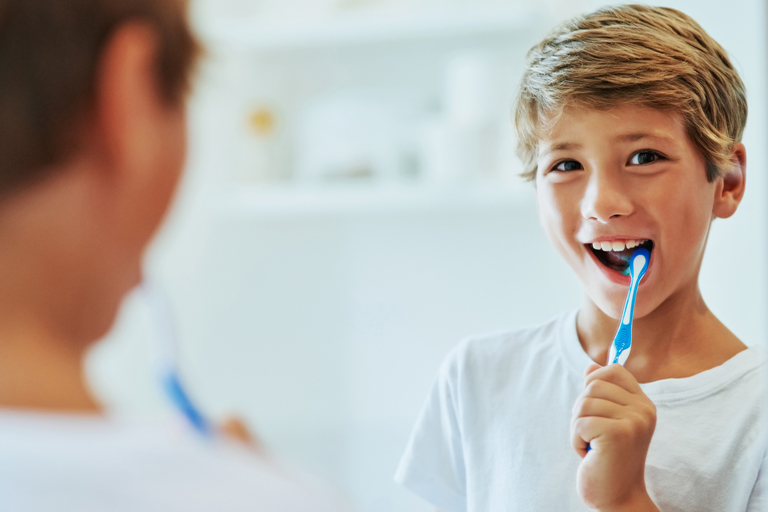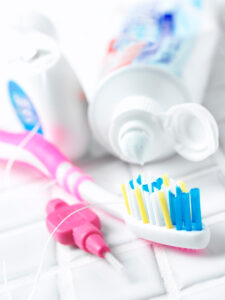
It’s something we should all do at least twice a day, so in terms of life skills; it’s got to be near the top of the list. Patients we see here at Wayside Dental in Harpenden, Hertfordshire, often need a refresher course so they keep their mouth and gums fresh and clean and have the perfect oral hygiene regime to last them a lifetime.
In this blog we look at the best way to get rid of bad bacteria and plaque build-up on your teeth as well as looking at brushing mistakes to avoid.

Choose a toothbrush with soft or medium nylon bristles. The top job for the brush is to effectively remove plaque and debris from your teeth, without irritating the gums or eroding tooth enamel, which is why it’s best to avoid using hard-bristled brushes.Your toothbrush should also fit comfortably in your hand and have a head small enough to easily reach all of your teeth, especially the ones at the back. If you have difficulty fitting the toothbrush into your mouth, it is probably too big.
Consider using an electric toothbrush which some people find easier to use, especially for back or wisdom teeth which can be cleaned without requiring you to move your actual brush too much. The latest electric brushes can also tell you if you’re applying too much pressure on your teeth and gums and give you an alert so you know you’ve brushed your teeth for long enough.
The bristles on your toothbrush wear out over time, losing their flexibility and effectiveness. Replace your toothbrush every three to four months, or as soon as the bristles start to splay and lose their shape. If you buy a new toothbrush whenever the season changes the weather can act as a good reminder. You can also buy toothbrushes whose handles will change colour when it’s time to purchase a new one.
If you continue to use old toothbrushes then bacteria can grow on the bristles making you more susceptible to mouth and gum infections.
Check your toothpaste contains fluoride, and make sure it has enough – for adults this is between 1,350 to 1,500 parts per million which reads as ppm on the tube. Fluoride is key in helping prevent tooth decay.
If you’re choosing vegan alternatives for toothpaste, again make sure that this contains fluoride.
Brush just a few teeth at a time and work your way around your mouth in a circle so that you get every tooth (spend about 12 to 15 seconds in each spot). If it helps, you can divide your mouth into quadrants: top left, top right, bottom left, and bottom right. If you spend 30 seconds on each quadrant, you’ll get a full two minutes of brushing time in. Many electric toothbrushes buzz after 30 seconds, a good aid for brushing in quadrants.
Position your toothbrush so it’s perpendicular to your lips and the bristles are resting on top of your bottom molars. Use an in-and-out motion and move from the back of your mouth to the front. Repeat on the other side of your mouth. When the bottom teeth are clean, flip the toothbrush over and work on the top molars.
Tip the toothbrush so that the head of the toothbrush is pointing towards your gum line and brush each tooth. The most skipped area is the inside of the lower front teeth, so be sure not to forget those! Check that your mouth is opening wide enough by holding teeth apart with two or three fingers of your other hand. This will allow correct vertical angle to reach edge of gum.
After you’ve cleaned your teeth, use the bristles of your toothbrush to gently clean your tongue. Don’t press too hard, or you may damage the tissue. This helps keep bad breath away and gets rid of bacteria on your tongue.
Our dental hygienists in Harpenden will always recommend you spit and not rinse your mouth out after brushing. By swilling water or mouthwash around your mouth directly after brushing you rinse away the fluoride and enamel-protecting properties of the toothpaste. Spitting is not necessarily an easy habit to get into but the more you do it, the easier it becomes.If you choose to rinse after brushing, take a sip of water from a disposable cup, or cup your hands under the tap. Swish it around your mouth and spit it out.
A common mistake when it comes to brushing teeth is to do so immediately after eating. A lot of food and drink contains acid which softens tooth enamel until the acidity of your mouth returns to normal . This has the effect of making your toothbrush more abrasive on the surface of teeth which can damage enamel. We recommend waiting at least 30 minutes after eating before brushing your teeth. The most important time of the day for teeth-brushing is just before bedtime as small particles of food and bacteria will have built up all day and they need removing before they cause plaque, tooth decay and even gum disease.
Bad brushing technique, see above, paired with a heavy hand can cause wear on your teeth and gums and potentially lead to receding gums. Brushing harder will not leave your teeth cleaner. A lot of electric toothbrushes have a sensor that will flicker a light if you are brushing too hard.
Brush at a slight angle, rather than square to the teeth, and focus on each tooth (tooth by tooth) instead of a side-to-side scrubbing motion.
Flossing is just as important as brushing, as it removes built-up plaque, bacteria and food particles that get trapped between the teeth. It’s just a fact that some toothbrushes just can’t reach the gaps between teeth even when used with up/down natural motion. It’s the food trapped between teeth that can be the most damaging to your oral health as, overtime, it turns to bacteria that then can lead to more serious dental problems. You should always floss before brushing your teeth so that any food or bacteria that comes loose during flossing doesn’t remain in your mouth.
Our final recommendation is to, where possible, use interdental brushes in conjunction with flossing. Flossing is great in removing food that’s stuck in the gaps between teeth but there’s no substitute for an interdental brush when it comes to cleaning the sides of your teeth.
If you follow the advice given above you’ll be giving yourself the very best chance to have a lifetime of healthy teeth and gums. As an extra precaution why not book an appointment with our dental hygiene team. There’s no substitute for a professional deep clean of your teeth and gums every 6 months.